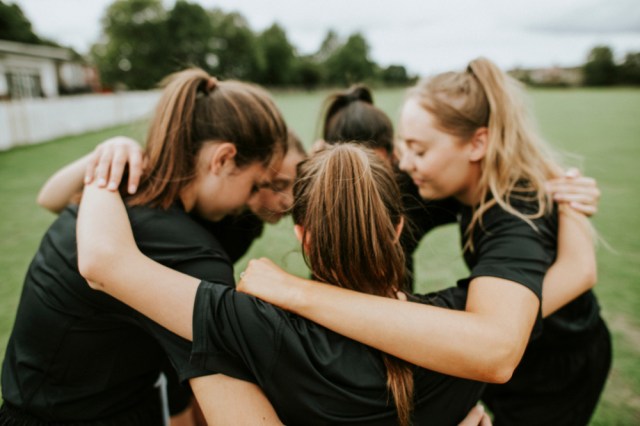Being an ally for your teammates doesn’t just mean posting on social media in support of a cause. It means standing up for them in tough situations, even when it’s uncomfortable. In sport and in school, this can be difficult. It can feel unpopular. But it’s the right thing to do.
Here, TrueSport Experts Kevin Chapman, PhD, clinical psychologist and founder of The Kentucky Center for Anxiety and Related Disorders, and President of Now What Facilitation, Nadia Kyba, MSW, are sharing their best advice for how you can truly support your teammates this season.
Understand what allyship means for your team
Being an ally for your teammates is part of being a good teammate. “As teammates, understand how much your words matter to the other people on the team,” says Chapman. “Not speaking up for others, letting injustices take place on your team, isn’t acceptable. It’s a cancer to the culture of the team.”
Acknowledge your own bias
Everyone has biases and developing a better understanding of the ones that you have can help you be a better ally to your teammates. “It’s not easy to think about your own biases,” says Kyba. “But it’s critically important. Think about the biases you’ve been raised with.” For example, often young girls are given white dolls, while boys are given white superhero action figures. This sets up the bias that girls are nurturing and caregivers, while boys are the brave, strong defenders. In addition to these gender-based biases, our unconscious bias becomes that being white is the norm.
Open the conversation with the team
It shouldn’t be the role of the transgender athlete on the team to push for a conversation about gender neutral bathrooms, or for the Black athlete to have to start the conversation around systemic racism. Being a good ally doesn’t just mean calling out aggressions and issues, it means being proactive. Consider asking your coach about having a team discussion around values and allyship. You may even want to ask a counselor who’s versed in these topics to come in to speak to the team. These preemptive measures not only make your teammates feel seen, but they may lead to a better understanding for the team as a whole. “Be active up front, rather than being passive until there’s a major issue,” says Kyba.
Remember differences aren’t always obvious
Some differences are more subtle, but equally important in terms of being a good ally. You may not have realized a teammate was Muslim, for instance, and needs to pray at certain times during the day. You may not know that a fellow athlete has a cognitive disability that makes it difficult for him to concentrate during team huddles. You may not be aware that one of your teammates is a transgender woman struggling to deal with a stadium’s bathroom policy.
With this in mind, try to take a moment to consider your personal biases and how you can better meet the needs of your fellow athletes, coaches, or volunteers.
Along with race and gender, think about other things that may have created biases in your life: your financial situation or how you were taught to think about class and money; your religion; your sexuality and gender expression; and how different disabilities may lead to certain biases. Understanding your own bias helps you become a better ally because it allows you to better understand the microaggressions and everyday biases that your teammates may encounter.
TrueSport supports athletes, parents, and coaches. Discover how >
 | About TrueSportTrueSport®, a movement powered by the experience and values of the U.S. Anti-Doping Agency, champions the positive values and life lessons learned through youth sport. TrueSport inspires athletes, coaches, parents, and administrators to change the culture of youth sport through active engagement and thoughtful curriculum based on cornerstone lessons of sportsmanship, character-building, and clean and healthy performance, while also creating leaders across communities through sport. |
For more expert-driven articles and materials, visit TrueSport’s comprehensive library of resources.
This content was reproduced in partnership with TrueSport. Any content copied or reproduced without TrueSport and the U.S. Anti-Doping Agency’s express written permission would be in violation of our copyright, and subject to legal recourse. To learn more or request permission to reproduce content, click here.
